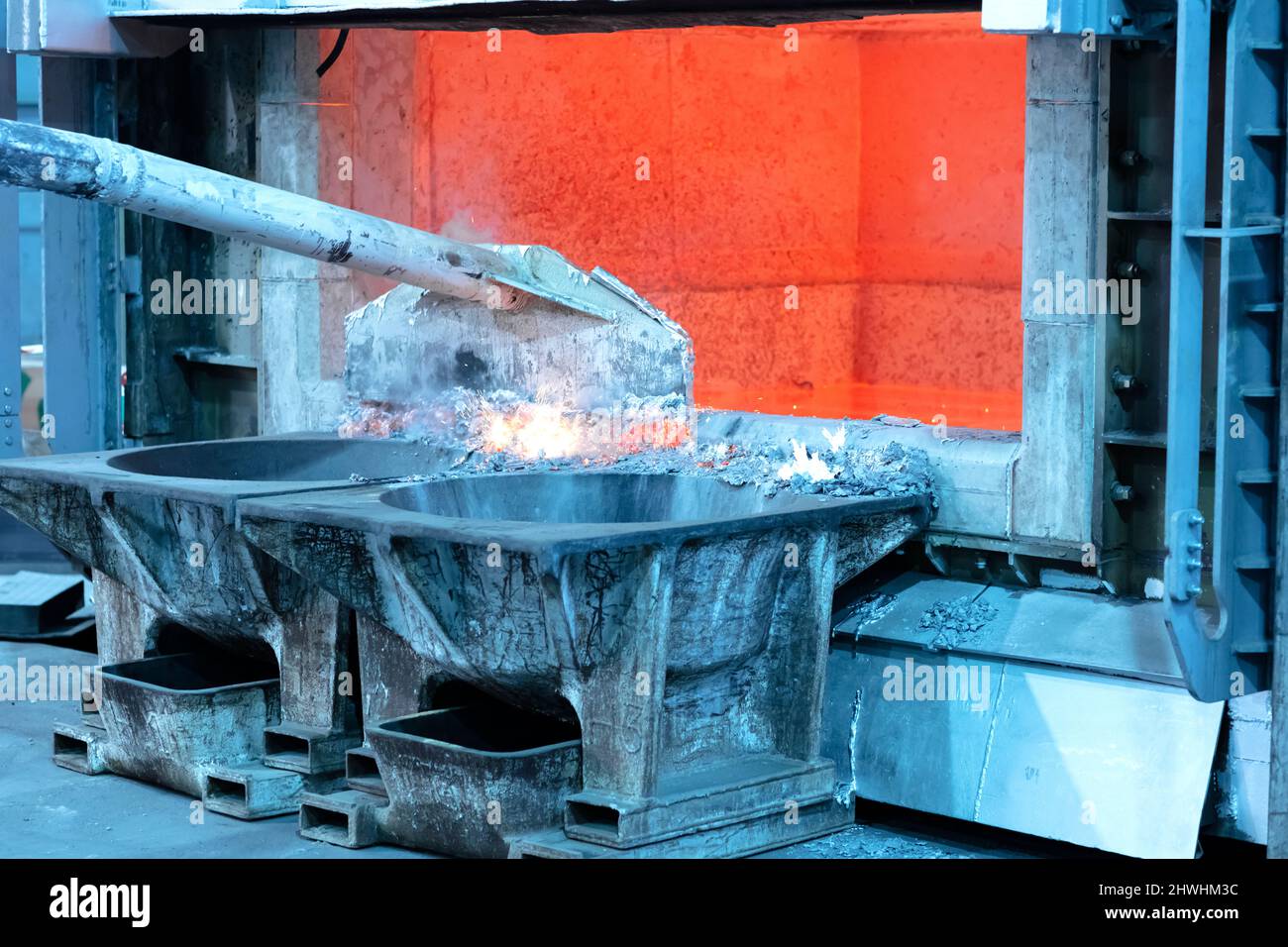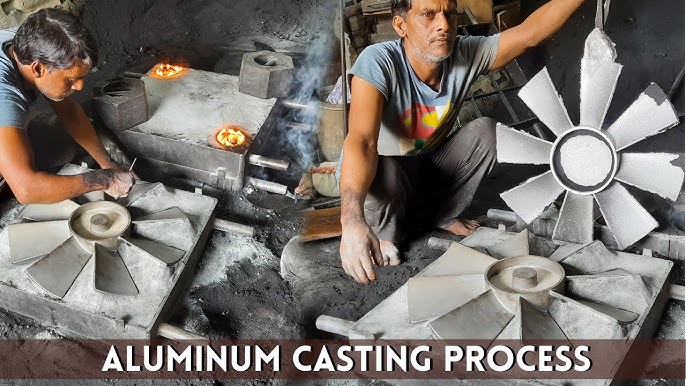Why Aluminum Foundry Wisconsin is chosen by numerous companies in casting
Wiki Article
Understanding the Benefits and Innovations in the Aluminum Foundry Industry
The Aluminum Foundry sector plays a vital function in modern production. Its lightweight homes especially boost fuel efficiency, especially in vehicle and aerospace fields. Furthermore, Aluminum's resistance to deterioration warranties long life in numerous applications. As the sector advances, innovations such as advanced recycling and additive manufacturing are reshaping manufacturing approaches. Discovering these improvements exposes not only the benefits but also the challenges ahead for Aluminum foundries in a quickly transforming market.The Lightweight Benefit of Aluminum
Aluminum's light-weight nature uses substantial benefits throughout different industries, particularly in manufacturing and transport. Its reduced density allows for the manufacturing of elements that are much easier to deal with and install, resulting in lowered labor expenses and enhanced efficiency. In the auto field, lighter automobiles contribute to boosted gas economic climate and lower emissions, lining up with worldwide sustainability objectives. In aerospace, the use of Aluminum reduces the general weight of aircraft, which is critical for boosting performance and lowering operational prices.Additionally, Aluminum's light-weight residential properties help with cutting-edge styles that were previously impractical with larger materials. This flexibility enables makers to develop complicated shapes and frameworks while maintaining structural honesty. Overall, the light-weight benefit of Aluminum not only improves item performance however additionally drives advancements in innovation and layout, making it a preferred material in different applications.
Deterioration Resistance and Sturdiness
The Aluminum Foundry sector is renowned for producing materials with remarkable deterioration resistance, making them perfect for different applications. This home, integrated with boosted architectural honesty, adds to the lasting performance benefits that Aluminum elements use. Because of this, sectors progressively count on Aluminum to fulfill requiring ecological problems without jeopardizing high quality.
Superior Rust Resistance
While different steels deal with considerable difficulties from environmental elements, Aluminum sticks out for its remarkable deterioration resistance, making it a recommended selection in many applications. This residential property is largely as a result of an all-natural oxide layer that bases on the Aluminum surface, offering a barrier against wetness and destructive representatives. Unlike other metals that may corrosion or break down with time, Aluminum keeps its honesty also in extreme atmospheres, such as coastal areas or industrial setups. Furthermore, its lightweight nature integrated with rust resistance makes it excellent for applications in aerospace, vehicle, and aquatic sectors. On the whole, Aluminum's remarkable toughness not just enhances product longevity however also lowers upkeep prices, presenting an engaging benefit for consumers and suppliers alike.Improved Architectural Stability
Engineers and developers significantly acknowledge the importance of boosted structural stability in modern applications, where both deterioration resistance and longevity are essential. Aluminum alloys, known for their light-weight properties, likewise show phenomenal resistance to rust, making them suitable for severe environments. The cutting-edge strategies used in the Aluminum Foundry industry add significantly to producing components with enhanced toughness. Advanced casting procedures and alloy make-ups are tailored to meet certain performance demands, ensuring that structures can stand up to extreme conditions without jeopardizing stability. Surface treatments and finishes boost the lifespan of Aluminum items, better reducing degeneration over time. This emphasis on boosted architectural integrity not only prolongs the use of materials however also minimizes maintenance prices, solidifying Aluminum's setting as a product of option in different markets.Long-lasting Performance Conveniences
Long-lasting efficiency in Aluminum elements is mainly credited to their exceptional deterioration resistance and sturdiness. Unlike several steels, Aluminum naturally develops a protective oxide layer, which prevents corrosion and deterioration in various settings, consisting of aquatic and industrial settings. This intrinsic building significantly extends the life-span of Aluminum products, reducing upkeep and replacement prices. Furthermore, the light-weight nature of Aluminum improves its applicability throughout industries without endangering stamina. The material's resistance to damage also contributes to its reliability in demanding applications, making it a perfect choice for automotive, aerospace, and building sectors. As industries progressively focus on sustainability and durability, Aluminum's efficiency advantages straighten with modern-day engineering demands, solidifying its role in cutting-edge production processes.Ecological Influence and Sustainability
 As the Aluminum Foundry market advances, it increasingly prioritizes environmental impact and sustainability, acknowledging the requirement for responsible methods despite climate adjustment. Efforts to reduce waste and energy consumption go to the center, with lots of foundries embracing reusing campaigns to reclaim Aluminum scrap. This not just lowers basic material usage you could try these out yet likewise especially reduces energy expenditure, as recycled Aluminum calls for just a portion of the power contrasted to main manufacturing.
As the Aluminum Foundry market advances, it increasingly prioritizes environmental impact and sustainability, acknowledging the requirement for responsible methods despite climate adjustment. Efforts to reduce waste and energy consumption go to the center, with lots of foundries embracing reusing campaigns to reclaim Aluminum scrap. This not just lowers basic material usage you could try these out yet likewise especially reduces energy expenditure, as recycled Aluminum calls for just a portion of the power contrasted to main manufacturing.Additionally, innovations in emissions control innovations are being carried out to lower air pollutants, aligning operations with stricter ecological laws. Foundries are also exploring alternative power resources, such as solar and wind, to power their centers sustainably. By promoting collaboration with stakeholders, the industry intends to create ingenious services that enhance eco-friendly stewardship. Jointly, these efforts highlight a commitment to reducing the Aluminum Foundry's carbon impact while advertising a circular economy within the production field.
Advanced Production Techniques
 Changing manufacturing processes, the Aluminum Foundry industry is significantly integrating innovative manufacturing strategies to improve efficiency and precision. Strategies such as computer mathematical control (CNC) machining and additive manufacturing have actually emerged as necessary components in maximizing production process. CNC machining permits high-precision element manufacture, considerably reducing material waste and manufacturing time. Meanwhile, additive production opens up new methods for complex geometries and light-weight designs that were formerly challenging to attain.
Changing manufacturing processes, the Aluminum Foundry industry is significantly integrating innovative manufacturing strategies to improve efficiency and precision. Strategies such as computer mathematical control (CNC) machining and additive manufacturing have actually emerged as necessary components in maximizing production process. CNC machining permits high-precision element manufacture, considerably reducing material waste and manufacturing time. Meanwhile, additive production opens up new methods for complex geometries and light-weight designs that were formerly challenging to attain.In addition, the release of automation and robotics in Aluminum foundries enhances procedures, minimizes human error, and enhances employee safety and security. These technologies click to investigate help with an even more receptive manufacturing setting, enabling manufacturers to adapt rapidly to market needs. The assimilation of innovative simulation software further enhances the design and testing phases, resulting in exceptional product high quality. Collectively, these methods not just enhance functional effectiveness however additionally foster technology, positioning the Aluminum Foundry industry at the leading edge of contemporary production.
Advancements in Reusing Processes
The Aluminum Foundry sector is not just advancing in manufacturing techniques but is likewise making substantial strides in recycling processes. Technologies are arising to boost the performance of reusing approaches, decreasing energy consumption and boosting sustainability. Advanced sorting innovations, such as automated optical sorting, make it possible for the identification and splitting up of Aluminum from various other materials with high accuracy. This causes a higher quality of recycled Aluminum, which is important for maintaining the stability of the end products.
Closed-loop recycling systems are being carried out, allowing suppliers to reuse Aluminum scrap within their very own production procedures. This reduces waste and advertises a circular economic climate. Additionally, study into new recycling methods, such as hydrometallurgical procedures, provides the possibility for recovering Aluminum from intricate waste streams. These developments not just contribute to minimizing the carbon impact of the Aluminum Foundry market however also reinforce its financial viability in a significantly environmentally aware market.
Applications Across Different Industries
Many industries informative post are increasingly identifying the versatility and benefits of Aluminum Foundry items, bring about widespread applications across markets such as automotive, customer, aerospace, and building and construction goods. In the auto industry, Aluminum spreadings add to lightweight automobile designs, enhancing fuel effectiveness and performance. Aerospace makers use Aluminum parts for their strength-to-weight proportion, vital for aircraft structures and elements.In building, Aluminum is favored for its resilience and resistance to corrosion, making it optimal for window frames, roofing, and structural supports. Durable goods additionally profit from Aluminum Foundry products, as seen in kitchenware, electronics, and product packaging, where light-weight and recyclable products are essential.
The flexibility of Aluminum Foundry methods permits complex styles and precise specifications, satisfying the diverse demands of these markets. Because of this, Aluminum Foundry products are becoming integral to modern-day production processes throughout different industries.
Future Fads in Aluminum Foundries
As sectors continue to evolve, Aluminum shops are poised to embrace numerous essential trends that assure to improve effectiveness and sustainability. One noticeable pattern is the enhancing fostering of digital innovations, including automation and expert system, which streamline operations and improve top quality control. Furthermore, the press in the direction of sustainable techniques is leading factories to buy recycling technologies, substantially decreasing waste and power consumption. An additional emerging fad is the use of sophisticated alloys and products, dealing with the growing demand for resilient and light-weight parts across different fields (Aluminum Foundry). The assimilation of additive production strategies is anticipated to transform part style, supplying modification and reducing lead times.
An additional emerging fad is the use of sophisticated alloys and products, dealing with the growing demand for resilient and light-weight parts across different fields (Aluminum Foundry). The assimilation of additive production strategies is anticipated to transform part style, supplying modification and reducing lead times.Collaboration with research organizations is likewise expected to drive development, as factories look for to establish brand-new processes and products. Aluminum Foundry. Collectively, these patterns show a transformative future for the Aluminum Foundry market, aligning with broader goals of sustainability and efficiency
Frequently Asked Questions
What Are the Typical Costs Related To Aluminum Foundry Production?
The typical costs associated with Aluminum Foundry production consist of basic materials, labor, power, devices maintenance, and overhead expenses. These variables jointly affect the general financial investment required for reliable Aluminum spreading operations.How Does Aluminum Compare to Various Other Steels in Stamina?
Aluminum, while lighter than numerous metals, shows remarkable strength-to-weight proportions. Compared to steel, Aluminum is less solid however provides excellent deterioration resistance, making it a desirable selection in applications where weight and longevity are crucial.What Precaution Are in Area in Aluminum Foundries?
Precaution in Aluminum shops normally include mandatory individual safety equipment, air flow systems to control fumes, normal devices upkeep, training programs for workers, and adherence to strict security policies to decrease risks related to molten steel handling.How Is Quality Assurance Managed in Aluminum Casting Processes?
Quality assurance in Aluminum casting procedures involves extensive inspections at numerous stages, consisting of resources assessment, procedure monitoring, and end product testing. Methods such as analytical procedure control and non-destructive testing warranty adherence to industry requirements.What Certifications Are Crucial for Aluminum Foundry Suppliers?
The value of qualifications for Aluminum Foundry providers consists of ISO 9001 for top quality management, ISO 14001 for environmental monitoring, and industry-specific criteria like ASTM and SAE, guaranteeing conformity, security, and integrity in manufacturing processes.The Aluminum Foundry market plays an essential role in contemporary production. The Aluminum Foundry sector is renowned for generating products with superior corrosion resistance, making them optimal for numerous applications. Changing manufacturing processes, the Aluminum Foundry industry is increasingly integrating sophisticated manufacturing techniques to improve effectiveness and accuracy. The Aluminum Foundry sector is not just progressing in producing strategies yet is additionally making substantial strides in reusing processes. As industries proceed to evolve, Aluminum foundries are poised to embrace numerous vital fads that assure to boost performance and sustainability.
Report this wiki page